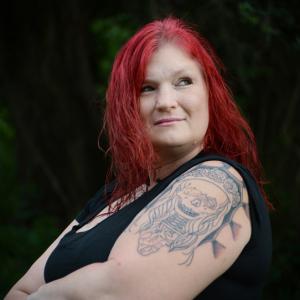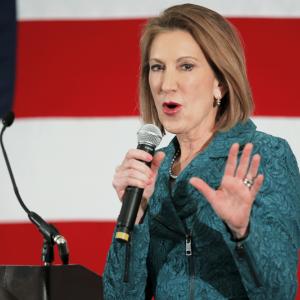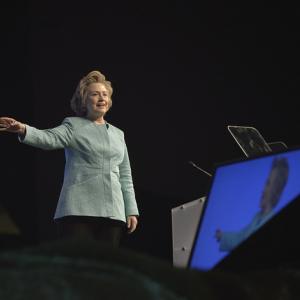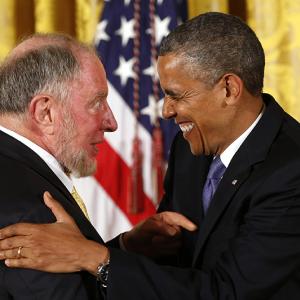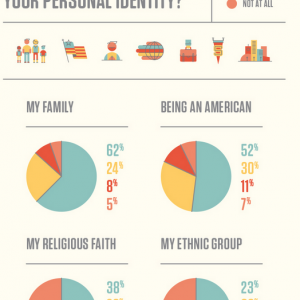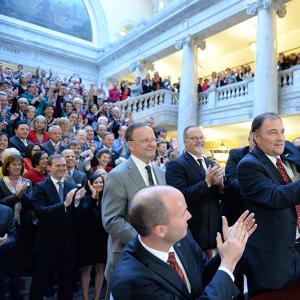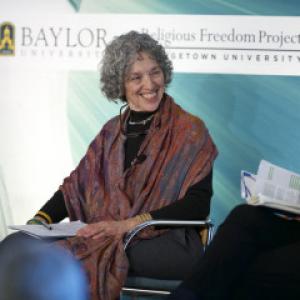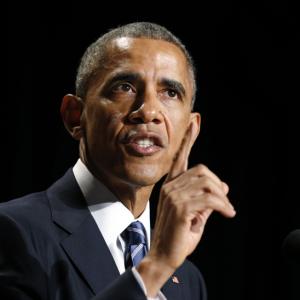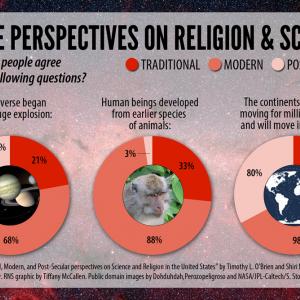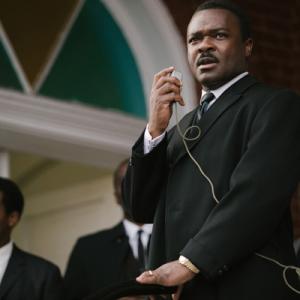Cathy Lynn Grossman is a senior national correspondent for Religion News Service, specializing in stories drawn from research and statistics on religion, spirituality, and ethics.
Posts By This Author
Christians Lose Ground, ‘Nones’ Soar in New Portrait of U.S. Religion
The United States is a significantly less Christian country than it was seven years ago.
That’s the top finding – one that will ricochet through American faith, culture, and politics – in the Pew Research Center’s newest report, “America’s Changing Religious Landscape,” released May 12.
This trend “is big, it’s broad, and it’s everywhere,” said Alan Cooperman, Pew’s director of religion research.
How Moms Set Children’s Spiritual Compass and Why it Matters
Religious identity used to be “inherited.” “Cradle Catholic” is shorthand for born into the faith; within Judaism, the faith is passed through a Jewish mother to her children unless they grow up to proclaim a different religion.
But children don’t just inherit parents’ spirituality, says psychologist Lisa Miller in her new book, The Spiritual Child. She writes that the essential sense of a transcendent power in the world — one that will love, guide, and accept them and wrap them in a protective layer of self-worth -– has to be nurtured.
Folk Religions Thrive with Women's Spirit
Unlike Christianity, Judaism, and Islam, historically all led by men, or the philosophies of the East such as Buddhism where male scholars and monks dominate, folk religions — close to village or tribe or ancestry — are often practiced and led by women.
Santa Muerte expert Andrew Chesnut, professor of religious studies at Virginia Commonwealth University and author of a book on the Mexican folk religion, Devoted to Death, calls it “the fastest-growing New Religious Movement in the Americas,” with more than 10 million followers.
5 Faith Facts about Carly Fiorina: ‘What You Make of Yourself Is Your Gift to God’
Carly Fiorina formally launched her 2016 presidential run on May 4. But she’s long been working the Christian talk and radio circuit appealing to a traditional Christian voter base.
Here are five faith facts about the former Hewlett-Packard CEO turned business consultant.
5 Faith Facts about Hillary Clinton, Social Gospel Methodist to the Core
As she embarks Sunday on her 2016 presidential campaign, one facet of Hillary Clinton, 67, is unchanged across her decades as a lawyer, first lady, senator, and secretary of state: She was, is, and likely always will be a social-justice-focused Methodist.
1) She was shaped by a saying popular among Methodists: “Do all the good you can, by all the means you can, in all the ways you can, in all the places you can, at all the times you can, to all the people you can, as long as ever you can,” says Paul Kengor in his book “ God and Hillary Clinton .”
As a girl, she was part of the guild that cleaned the altar at First United Methodist Church in Park Ridge, Ill. As a teen, she visited inner-city Chicago churches with the youth pastor, Don Jones, her spiritual mentor until his death in 2009. During her husband’s presidency, the first family worshipped at Washington’s Foundry United Methodist Church, and Time magazine described her membership in a bipartisan women’s prayer group organized by evangelicals.
2) Clinton’s been known to carry a Bible in her purse but, she told the 2007 CNN Faith Forum, “advertising” her faith “doesn’t come naturally to me.” Every vote Clinton made as a senator from New York, she said, was “a moral responsibility.” When asked at the forum why she thought God allows suffering, Clinton demurred on theology, then swiftly turned her answer to activism: “The existence of suffering calls us to action.”
Robert Putnam Fights America’s ‘Opportunity Gap’ with Religious Fervor
Harvard professor Robert Putnam jokingly calls himself “a nice Jewish formerly Methodist boy.”
But the public policy expert’s new book, Our Kids, reads more like a tent meeting revival, complete with an “altar call” at the end. His private meetings and public appearances at the White House and Capitol Hill, and meetings with civic and faith leaders across the country, carry the same fervor.
While evangelists convict people of their sinful ways and then convert them to the path of salvation for the hereafter, Putnam’s focus is more on this side of heaven.
His goal: to awaken and inspire Americans to “save” young people from a future trapped in a spiral of fractured families, poor schooling, and a grim economic future that Putnam says will cost taxpayers trillions of dollars. Trillions.
He is not only aiming for political, social, and religious elites. He’s also aiming at the everyday reader from Boston to Dubuque with a message that failure to act will “undermine democracy and political stability for all.” That’s why the book is subtitled, “The American Dream in Crisis.”
“I’m writing for ordinary people, not the political class. I’m holding up a mirror of American society to the ‘haves’ to say ‘look what we’ve become,’” he said.
Americans Don’t Cite ‘God, Family, Country’ Quite Like the Cliche Goes
“God, family and country” might make for a good country music tune, but that’s not really how most Americans see the strongest influences on their personal identity.
The real order is family first (62 percent), followed by “being an American” (52 percent). “Religious faith” lolls way down in third place (38 percent) — if it’s mentioned at all, according to a survey released March 19 by The Barna Group.
The California-based Christian research company found another 18 percent of those surveyed said faith had a little to do with idea of who they are, and nearly 20 percent scored it at zero influence.
Christians were the largest self-identified group in the survey and Barna looked at them two ways. “Practicing” Christians — defined in the survey as self-identified Catholics, Protestants and Mormons who say they have attended church at least once in the last month and/or say religion is important to them — scored faith first, at a rate more than double the national average.
Utah’s New Law a ‘Toolkit’ for Fighting LGBT Discrimination, Say Activists, Legal Experts
Utah’s new law extending employment and workplace protections to LGBT people and conscience protections to individuals, churches, and faith-based associations extends an olive branch to both groups, even as it misses one key sticking point.
Panelists for two discussions hosted by the Brookings Institution on March 16 described key features of the legislation, noting that it is:
- Unique to Utah, with its distinctive religious and political history, not a template for other states or for federal legislation.
- A measure of healing between the Church of Jesus Christ of Latter-day Saints and LGBT people.
- A law that says nothing about whether bakers, florists or other vendors must accept customers planning a same-sex wedding, even if such marriages violate their religious beliefs.
- A layer of robust protections for religious groups.
Even though other states may not replicate this law exactly, it can serve as a toolkit for orchestrating opposing forces to find common ground, legal and political, experts said.
Former Utah Gov. Michael Leavitt, a Mormon who cautioned that he was not a spokesman for the church, called the legislation “a great victory for the protection of conscience.”
Leavitt said the LDS church convened the effort to write the legislation with LGBT activists in an effort to heal the tensions between the two communities, inflamed when the church joined efforts to ban same-sex marriage in California in 2008.
“It is a doctrine of the church that marriage is between one man and one woman and it will not change,” said Leavitt.
But it is also a doctrine of the church that “Jesus Christ would not abide by the withholding of shelter or sustenance or care.”
Gay Marriage Gains Rapid Support with U.S. Public, Including Conservatives
As the Supreme Court readies to hear a group of cases that could make same-sex marriage legal from coast to coast, support for allowing gays and lesbians to marry is piling in from all directions.
On April 28, the court will hear arguments in four related cases that address whether state bans on gay and lesbian marriages are constitutional. The ruling is expected by late June.
But new opinion polls and friend-of-the-court briefs that were due March 6 show widespread acceptance of marriage as a right for all.
Climbing public support: The rate of growth for supporting same-sex marriage has risen so rapidly even the director of the national biennial General Social Survey is marveling at the speed of change.
Faith-Based Aid Groups Face a Hurdle: The Faith that Drives Them
Leaders of Christian and Jewish international aid groups say their efforts are often met with twin suspicions: That the real purpose is to proselytize; and that a religious message is tied to material aid.
Not so, say Pastor Rick Warren, who has led Saddleback Church to donate millions of dollars and hours of labor in Africa, and Ruth Messinger, president of American Jewish World Service.
The two were keynote speakers at a discussion on “Proselytism and Development in Pluralistic Societies,” sponsored by the Berkley Center for Religion, Peace & World Affairs, at Georgetown University.
Both acknowledged at the March 4 event that their motives — “living like Jesus,” said Warren, and “pursuing justice,” said Messinger — are questioned.
The Changing Spirituality of Women
Nadia Bulkin, 27, the daughter of a Muslim father and a Christian mother, spends “zero time” thinking about God.
And she finds that among her friends — both guys and gals — many are just as spiritually disconnected.
Surveys have long shown women lead more active lives of faith than men, and that millennials are less interested than earlier generations. One in three now claim no religious identity.
What may be new is that more women, generation by generation, are moving in the direction of men — away from faith, religious commitment, even away from vaguely spiritual views like “a deep sense of wonder about the universe,” according to some surveys.
Michaela Bruzzese, 46, is a Mass-every-week Catholic, just like her mother, but she sees few of her Gen X peers in the pews.
Can Obama Walk the Tightrope of Religious Rhetoric in a Polarized America?
After taking heat from the religious right for saying Christians and Muslims have all committed horrors in God’s name, President Obama is now angering the religious left with an upcoming White House conference on combating ”violent extremism” that seems to focus only on Muslims.
The back-to-back controversies raise the question: Can Obama — or any president — safely discuss faith in today’s political crosswinds?
No, say experts who keep a close eye on presidential God talk. It’s a perilous walk, taken without a safety net as news and social media voices wait to savage him in a nanosecond.
Obama’s remarks at the National Prayer Breakfast triggered fury when Obama mentioned the Crusades, the Inquisition and Jim Crow segregation laws as examples of Christian violence in God’s name.
“This is not unique to one group or one religion,” Obama said. “There is a tendency in us, a sinful tendency that can pervert and distort our faith.”
Pastors: ‘Fifty Shades of Grey’ Film Glamorizes Sexual Abuse and Violence
The film adaptation of Fifty Shades of Grey, which opens in theaters on Feb. 13, has movie morality guardians armed and heading for battle.
The Catholic bishop of Buffalo, N.Y., has warned fellow prelates to step up preaching on the true beauty of sex-within-male-female-marriage — and do it pronto.
“Remind the faithful of the beauty of the Church’s teaching on the gift of sexual intimacy in marriage, the great dignity of women, and the moral reprehensibility of all domestic violence and sexual exploitation,” wrote Bishop Richard Malone, in a letter Feb. 4 to fellow clergy at the U.S. Conference of Catholic Bishops.
His letter came with multiple links to resources, some 15 to 20 years old, showing the church’s consistent stand against domestic violence and pornography.
The Catholic clergymen could be facing a juggernaut: Fandango reports box-office pre-sale numbers are soaring, particularly in the Bible Belt and the Midwest.
The Fifty Shades books by British writer E.L. James have sold more than 100 million copies.
But the movie trailer — and a Super Bowl ad scrubbed of anything very sexual — sent opposition to the film into high gear.
Freedom of the Press Trumps Respect for Religion in a New Survey
Most Americans who know about the deadly attack on the Paris headquarters of the satirical Charlie Hebdo magazine say it’s OK that the weekly featured cartoons of the Prophet Muhammad.
A new survey from the Pew Research Center shows 76 percent of Americans know of the Jan. 7 attack, and among this group 60 percent of Americans support the magazine’s right to publish these controversial images, while 28 percent disapprove.
However, one in four Americans overall offered no opinion because, they said, they had not heard about the violent attack where 10 artists and writers and two policemen were murdered.
The survey of 1,003 U.S. adults was conducted Jan. 22-25, two weeks after the attack. It has a margin of error of plus or minus 4.7 percentage points in the portion of the report that deals only with those who said they had heard about the incident.
The survey looked more closely to see how members of this group explained their views.
Science vs. Religion? There’s Actually More of a Three-Way Split
Meet the “Post-Seculars” — the one in five Americans who no one seems to have noticed before in endless rounds of debates pitting science vs. religion.
They’re more strongly religious than most “Traditionals” (43 percent of Americans) and more scientifically knowledgeable than “Moderns” (36 percent) who stand on science alone, according to two sociologists’ findings in a new study.
“We were surprised to find this pretty big group (21 percent) who are pretty knowledgeable and appreciative about science and technology but who are also very religious and who reject certain scientific theories,” said Timothy O’Brien, co-author of the research study, released Jan. 29 in the American Sociological Review.
Put another way, there’s a sizable chunk of Americans out there who are both religious and scientifically minded but who break with both packs when faith and science collide.
What’s God Got to Do with Football Devotion? Plenty.
Did God lift Seahawks quarterback Russell Wilson’s overtime pass into the end zone on Sunday, rewarding the prayerful Christian player with a championship victory and a trip to the Super Bowl?
Millions of Americans may think so.
“One in four Americans believe there will be a 12th man on the field, and that the hand of God will be seen before the final whistle blows in the Super Bowl,” said Robert Jones, CEO of Public Religion Research Institute.
And 53 percent agree God “rewards athletes who have faith with good health and success,” according to a new PRRI/RNS Religion News Survey released Jan. 22.
Indeed, not only did majorities of all but one major religious group put faith in God regarding the faithful, so did 27 percent of the those who claim no religion, the “nones.”
U.S. Churchgoers Still Sit in Segregated Pews, and Most Are OK with That
On the Rev. Martin Luther King Jr.’s birthday (Jan. 15), just as the civil rights drama Selma was nominated for best picture in the Oscar race, one fact of American life was little changed.
Sunday morning remains, as King once observed, the most segregated hour in America. And, against a backdrop of increased racial tensions, new research shows that most Americans are OK with that.
Two in three (66 percent) Americans have never regularly attended a place of worship where they were an ethnic minority, according to new polling analysis released by LifeWay Research.
“People like the idea of diversity. They just don’t like being around different people,” said Ed Stetzer, executive director of the Nashville, Tenn.-based research firm.
“Maybe their sense is that church is the space where they don’t have to worry about issues like this,” he said. But that could be a problem, because, Stetzer said, “If you don’t like diversity, you’re really not going to like heaven.”
Alan Gross Release Hailed as Hanukkah ‘Miracle,’ First Step in ‘Normalized’ U.S.-Cuba Relations
Alan Gross, the Jewish international aid worker held on alleged spy charges in Cuba for five years, was freed on Dec. 17 — what some are calling a Hanukkah miracle on the first day of the holiday that celebrates religious freedom.
Gross, 65, of Maryland, has always claimed that he only went to Cuba to bring communications equipment to the small Jewish community left in Havana. However, the Castro government said he was part of a spy network attempting to set up a secret network for Cuban Jews. Gross was serving a 15-year sentence.
President Obama chose the Dec. 17 release as a springboard to announce a massive historic “normalization” of U.S.-Cuba relations. Meantime, in Cuba, President Raul Castro, who held a press conference in Havana at noon, was expected to release 53 Cuban political prisoners.
Obama particularly credited the “moral example of Pope Francis,” who actively encouraged Gross’ release. Francis, who held private meetings at the Vatican to secure the deal, praised the move, sending “his warm congratulations for the historic decision taken by the Governments of the United States of America and Cuba to establish diplomatic relations, with the aim of overcoming, in the interest of the citizens of both countries, the difficulties which have marked their recent history.”
We’re Awestruck About Earth, Unsure About Global Warming
Most Americans say they feel a deep connection to the wider world.
But all that spiritual stargazing makes no difference in views about the facts of climate change and global warming, a new survey finds.
Just 5 percent of Americans thought climate change was the most important issue in the U.S. today. And religion was a major dividing point on how much — or how little — they think it’s a matter of concern, according to a new survey by the Public Religion Research Institute.
“We asked about spiritual measures such as being in awe of the universe, and you might think it would correlate with views about the universe. But, in fact, they have very little relationship,” said Robert Jones, CEO of PRRI, which conducted the survey on U.S. adults’ attitudes toward climate change, environmental policy and science.
Brittany Maynard Advocates from the Grave
Brittany Maynard chose to die Nov. 1, but on what would have been her 30th birthday Nov. 19, her voice in support of the Right to Die movement rang loud.
Maynard, who had an aggressive brain tumor, was the face of Compassion & Choices, the advocacy group campaigning to legalize physician-assisted dying in all 50 states. She still is.
On her birthday, the group released a “call to action” video with passages and narration drawn from prerecorded videos with Maynard (pronounced MayNARD) and other advocates explaining why the right to die by legal prescription is important to them. It is now legal in Oregon, Washington, Montana, Vermont, and New Mexico.
In the video, Maynard concludes: “If there’s one message to come away from everything that I’ve been through, it is no matter what life kind of presents you with, is never be afraid to use your own voice. And even if you are uncertain, even if your voice is shaking, ask the questions you want to ask, speak up for yourself. Advocate.”


